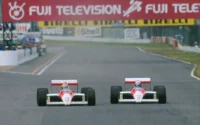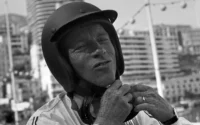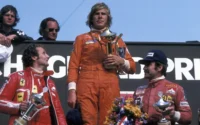Lola hesitated for many years to establish a factory Formula One team, opting to build cars for other outfits instead. However, when Lola made its first factory team entry in 1997, it resulted in the company’s financial collapse.
1962 Bowmaker and Parnell
In 1962, Lola entered Formula One by supplying Mk4 cars to Reg Parnell’s Bowmaker-Yeoman Racing Team, which featured drivers John Surtees and Roy Salvadori. The team achieved immediate success when Surtees’s car secured pole position in its debut World Championship race. Despite frequently scoring points, the team never won a Championship Grand Prix. Following Bowmaker’s withdrawal from the sport, Parnell kept the cars running on a private basis. Privateer Bob Anderson claimed the Mk4’s final win at the non-Championship 1963 Rome Grand Prix. Despite these efforts, consistency eluded the team, and after only two seasons, Lola temporarily withdrew from producing Formula One cars.
1967 Honda RA300 and RA301 (nicknamed “Hondola”)
In 1967, Lola collaborated with Honda Racing and John Surtees on designing their Formula 1 car. Honda’s original design, an overweight chassis, was discarded in favour of using a 1966 Lola Indianapolis monocoque (the Lola T90) as the foundation for the new Honda-engined vehicle. This car, officially named the Honda RA300 but referred to as the “Lola T130” by Lola Cars and dubbed the “Hondola” by the media, was light and powerful enough to secure a victory at the 1967 Italian Grand Prix.
1974 – 1975 Embassy Hill
Graham Hill struggled to secure factory drives in the twilight of his racing career. With ambitions to continue in racing and begin a new chapter as a team owner, he established his own team, Embassy Racing With Graham Hill, sponsored by Embassy Cigarettes. After a challenging 1973 season using a customer Shadow car, the team partnered with Lola to design their own vehicle. The resulting T370 was heavily influenced by the Formula 5000 cars of that era and bore a resemblance to Lola’s F5000 models, though it featured a larger airbox. Andy Smallman further developed this design into the Hill GH1 in 1975. Tragically, the team’s first completely in-house design, the Hill GH2, went unraced following the deaths of Hill, Tony Brise, Smallman, and several team members in an aeroplane crash in November 1975.
1985 – 1986 Haas Lola
The Haas Lola F1 program, under the large American conglomerate Beatrice Foods and managed by the experienced Teddy Mayer, initially seemed promising with the anticipation of a works Ford power unit deal. Despite the visually appealing design primarily by Neil Oatley, the car was only nominally a Lola, since Haas served as Lola’s U.S. concessionaire, although Eric Broadley did have some involvement. Alan Jones was persuaded out of retirement to drive the car in the later part of the 1985 season, joined by Patrick Tambay in a second car for 1986. Initially promised a works Ford-Cosworth turbocharged engine, the team started with older Hart four-cylinder units until the new engines arrived in 1986. The combination of the car, engines, drivers, and sponsors led to various challenges, and the team dissolved after the 1986 season, selling most of its assets, including the factory, to Bernie Ecclestone. Ecclestone, interested in acquiring the Ford engines for his Brabhams, briefly used the team’s factory to construct the Alfa Romeo “ProCar,” a doomed project that combined touring car aesthetics with F1 mechanics.
1987 – 1991 Larrousse & Calmels
Starting with a modest approach, the Larrousse & Calmels program initially utilised simple Cosworth-powered cars based on Lola’s F3000 technology. Over time, the team, running normally aspirated F1 cars, built a solid reputation from 1987 onward. By 1989, they upgraded to Lamborghini V12 engines and, with a car designed by Chris Murphy, achieved commendable results with drivers Éric Bernard and Aguri Suzuki. The team faced setbacks following Didier Calmels’s arrest for murder but continued at a reduced capacity with Cosworth engines. However, a technicality in their F1 entry in 1990 led to losing all their Constructors’ Championship points, which inadvertently benefitted the politically connected Ligier team.
1993 Scuderia Italia
The Scuderia Italia’s venture with Lola in 1993 was fraught with difficulties. Previously achieving moderate success with Dallara chassis, the team struggled significantly with the Lola cars and customer Ferrari engines, which were not competitive. Drivers Michele Alboreto and Luca Badoer frequently failed to qualify for races. Badoer’s 7th place finish at the 1993 San Marino Grand Prix marked the season’s highlight for Lola. The team withdrew from F1 before the season’s last two races and partially merged with Minardi in 1994.
1997 MasterCard-Sponsored Works Programme
Lola had initially planned to enter Formula 1 in 1998, but intense pressure from their main sponsor, MasterCard, sped up the debut of their new car to 1997. The sponsorship strategy was unique, tying into both a membership of a “club” offered by MasterCard and dependent on racing results, which are challenging for a debut F1 team to secure. The cars were initially supposed to be equipped with custom-built V10 engines from Al Melling, but they started the season with less powerful Ford Cosworth ED V8s.
The cars encountered numerous issues, particularly with aerodynamics. They had not been tested in a wind tunnel before their arrival in Australia—a critical oversight by that era’s standards. The car’s design was fundamentally flawed, with the lack of wind tunnel testing further diminishing its competitiveness. Despite these significant challenges, the team remained optimistic about outperforming some competitors. However, the results were catastrophic; the cars were significantly slower than expected, barely matching the pace of Lola’s Formula 3000 cars. After a disastrous single race, the sponsors withdrew their support. The team appeared at the second race in Brazil, but the cars did not compete, marking the abrupt end of the MasterCard Lola venture. Soon after, the Lola Car Company entered receivership, ultimately rescued by Martin Birrane’s purchase and financial intervention.
Lola Cars Formula One World Championship Records
| First entry | 1962 Dutch Grand Prix |
| Engines | Climax, BMW, Ford, Lamborghini, Ferrari |
|---|---|
| Entrants | Bowmaker-Yeoman, Reg Parnell, Tim Parnell, DW Racing Enterprises, BMW, Lola Cars, Embassy Hill, Team Haas, Larrousse, Scuderia Italia, MasterCard Lola |
| Races entered | 151 |
| Race victories | 0 |
| Constructors’ Championships | 0 |
| Drivers’ Championships | 0 |
| Podiums | 3 |
| Points | 43 |
| Pole positions | 1 |
| Fastest laps | 0 |
| Last entry | 1997 Australian Grand Prix |
Lola Cars Constructors’ Championship Results
| Year | Name | Car | Drivers | Points | WCC |
|---|---|---|---|---|---|
| 1962 | Bowmaker-Yeoman Racing Team | Mk4 | John Surtees Roy Salvadori | 19 | 4th |
| 1963 | Reg Parnell Racing | Mk4A | Maurice Trintignant Chris Amon Lucien Bianchi Masten Gregory Mike Hailwood | 0 | NC |
| 1963 | Tim Parnell | Mk4 | John Campbell-Jones | 0 | NC |
| 1963 | DW Racing Enterprises | Mk4 | Bob Anderson | 0 | NC |
| 1967 | Bayerische Motoren Werke | T100 | Hubert Hahne | 0 | NC |
| 1967 | Lola Cars Ltd. | T100 | David Hobbs | 0 | NC |
| 1967 | David Bridges | T100 | Brian Redman | 0 | NC |
| 1968 | Bayerische Motoren Werke | T102 | Hubert Hahne | 0 | NC |
| 1974 | Embassy Hill | T370 | Graham Hill Guy Edwards Peter Gethin Rolf Stommelen | 1 | 12th |
| 1975 | Embassy Hill | T370 T371 | Graham Hill Rolf Stommelen | 0 | NC |
| 1985 | Team Haas | THL1 | Alan Jones | 0 | NC |
| 1986 | Team Haas | THL1 THL2 | Alan Jones Patrick Tambay Eddie Cheever | 6 | 8th |
| 1987 | Larrousse Calmels | LC87 | Yannick Dalmas Philippe Alliot | 3 | 9th |
| 1988 | Larrousse Calmels | LC88 | Yannick Dalmas Philippe Alliot Aguri Suzuki Pierre-Henri Raphanel | 0 | NC |
| 1989 | Equipe Larrousse | LC88B LC89 | Philippe Alliot Yannick Dalmas Éric Bernard Michele Alboreto | 1 | 16th |
| 1990 | Espo Larrousse F1 | LC89B LC90 | Éric Bernard Aguri Suzuki | 11 | 6th |
| 1991 | Larrousse | LC91 | Éric Bernard Aguri Suzuki Bertrand Gachot | 2 | 11th |
| 1993 | Scuderia Italia | T93/30 | Michele Alboreto Luca Badoer | 0 | NC |
| 1997 | MasterCard Lola | T97/30 | Vincenzo Sospiri Ricardo Rosset | 0 | NC |
Source: Wikipedia.com




